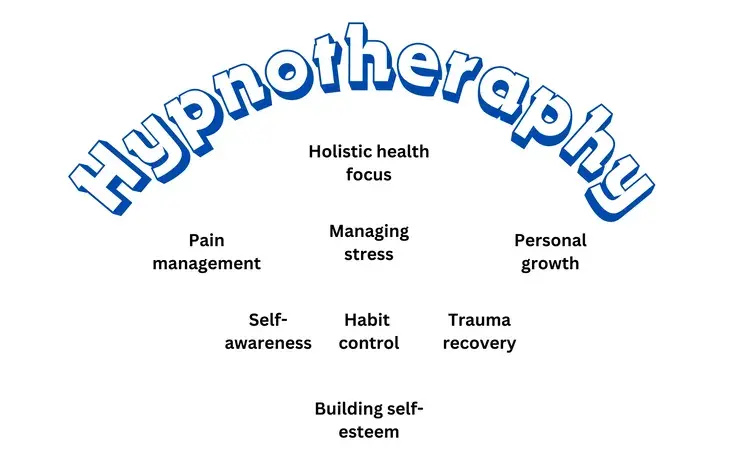Professional Hypnotherapy Training Program
Our fascinating Professional Hypnotherapy Training Program will train you for real-world success. Expand your therapeutic skills, learn from industry experts, and establish a successful hypnotherapy practice.
School Counsellors, Teachers, Aspiring Psychologists, Special Educators, Students
3 Months
Interaction Based Online Classes
- Certificate
- Letter of Recommendation
- Grade Sheet
Hypnotherapy Courses is an extremely efficient treatment method that utilizes altering states of mind to facilitate positive changes. Hypnotherapy certification provides extensive training in the science as well as practice. It helps one to address the wide array of problems that clients face. Hypnotherapy is utilized to help with anxiety, phobias, the management of pain, quitting smoking and weight loss.
Our course focuses on conceptual understanding as well as practical application. Participants will learn about a range of hypnotic techniques such as induction, deepening and suggest therapy. They will be taught how to conduct assessments for clients, develop customized treatment plans, and use hypnotherapy safely across a range of contexts, as opposed to medical procedures that focus on helping clients tap into their inner resources to heal and transform.
In the course, participants will be able to learn, play a role and review the case research. This type of experiential learning method will ensure that the learners are confident and competent in their online hypnotherapy training. Training in hypnotherapy, specifically in a professional setting, provides significant experience in the field by connecting theoretical knowledge and practical application.
A professional hypnotherapy training program will significantly enhance your career opportunities by expanding professional networks, offering opportunities for mentorship, and enhancing graduates’ competitiveness in alternative and complementary therapies or in integrating hypnotherapy with current practices.
The Healing Powers of Hypnotherapy: Top Benefits

What To Expect From Our In Depth Hypnotherapy Training Program
Our professional Hypnotherapy Training Program provides a solid foundation of research-based hypnotic methods and applications for therapeutic purposes. Students will learn to conduct thorough consultations with clients and create hypnotic inductions that are customized and utilize a variety of hypnotherapeutic practices, such as suggestions therapy, age regression, or parts therapy. Students will be taught how to deal with a variety of issues that clients face, such as managing stress, changing habits and pain management, and emotional regulation. Mentorship and supervision are the key elements that will ensure that trainees receive expert guidance and assistance in their pursuit of professional growth as Hypnotherapists.
- Lifetime Access To Study Materials
- E- Certificate / Hard Copy
- Letter of Recommendation
- Lifetime Learning Support
- Job Opportunities
- Online Resources
- Recorded Classes
- Get Identity Card
- Startup Support
- 24/7 Chat Facility
- Get Notified Before Classes
- Constant Academic Counsellor Support
Explore Our Government-Recognized Accredited Courses
Learn more about the fascinating realm of human behavior with our broad range of psychology courses. Whether you are looking for short-term or long-term diploma courses, we will provide valuable insights and practical applications to help you reach great heights in the future.
See What Our Students Are Saying
EXCELLENTTrustindex verifies that the original source of the review is Google. The session was informative and highly useful. The overall journey of the Psychotherapy Practical Program was a great learning experience, providing valuable insights and a deeper understanding of therapeutic processes.Posted onTrustindex verifies that the original source of the review is Google. I took the "Counselling Practical Internship" in ICS and it was very good and informative. The ICS team and the educatocator who taught us were very helpful and provided us the sustainable meterials for future studies and life. Thank you.Posted onTrustindex verifies that the original source of the review is Google. Highly motivated and inspiring educators. Akriti Khosla was especially brilliant!Posted onTrustindex verifies that the original source of the review is Google. Great session 👍🏻 Each activity nicely explained. It was a great learning experience.Posted onTrustindex verifies that the original source of the review is Google. Great course, teaching and non teaching staff are supportive, good material and we are given the lifetime access to all the materialPosted onTrustindex verifies that the original source of the review is Google. Good teachers and get to depth of thingsPosted onTrustindex verifies that the original source of the review is Google. I recently completed the Counseling Practical Internship and found it extremely valuable and enriching. The course provided strong practical exposure to various psychological techniques, assessments, and therapeutic skills.Posted onTrustindex verifies that the original source of the review is Google. My experience learning psychology in ICS has been really good and enriching. The course helped me understand human behaviour, thoughts, and emotions clearly and interestingly. I especially appreciate Sonali Ma'am for explaining the concepts with real-life examples, making them more practical and relatable. Overall, studying psychology in ICS has improved my understanding of people and enhanced my analytical and thinking skills.
Meet Your Trainers For This Course

Mansi Aggarwal
Mansi is a mental health practitioner with over 6 years of experience in Psychotherapy, Psychometrics, and Scientific Research. With 3.5 years of experience working with a varied spectrum of clients, she had embraced a trauma-informed and rights-based approach to mental health. Her expertise covers trauma, interpersonal relationships, work and life stressors, identity and sexuality issues, and grief. Along with contributing to achieving therapeutic goals, she establishes a comfortable and compassionate environment for her client’s healing journeys.
– Psychotherapist, Clinical Hypnotherapist, Researcher
FAQ (Frequently Asked Questions)
What is a Hypnotherapy Training Program?
The Hypnotherapy Education Program can be described as a planned training program that teaches people the fundamentals and methods of hypnotherapy. It covers the science behind the hypnosis process, the methods to induce an hypnotic state, as well as the use of hypnosis to achieve purposes of therapy, such as anxiety reduction, behavior modification, and emotional healing.
What are the advantages of completing a Hypnotherapy Training Program online?
The Hypnotherapy Training Program online can provide many benefits such as:
- flexibility: Learn at your own pace, from within the privacy of your own home.
- Cost-effective: Online courses are typically more affordable than in-person training.
- Access to expert instructors: Get guidance from skilled hypnotherapists via live and recorded sessions.
- comprehensive learning materials: Access downloadable resources including case studies, case studies, along with guided hypnosis scripts.
What will I learn from the Hypnotherapy Training Program?
This program will include:
- The underlying principles of hypnosis as well as its use in therapy.
- Techniques for achieving and sustaining an hypnotic experience.
- How to utilize hypnotherapy to aid in the management of stress, control of habits and emotional wellbeing.
- Best practices and ethical considerations for the profession of hypnotherapists.
- Practice exercises that will help you build your abilities and build confidence.
How can I register for this course?
You can enroll in this course by clicking the “Enroll Now” button or visiting our website and following the registration process.
